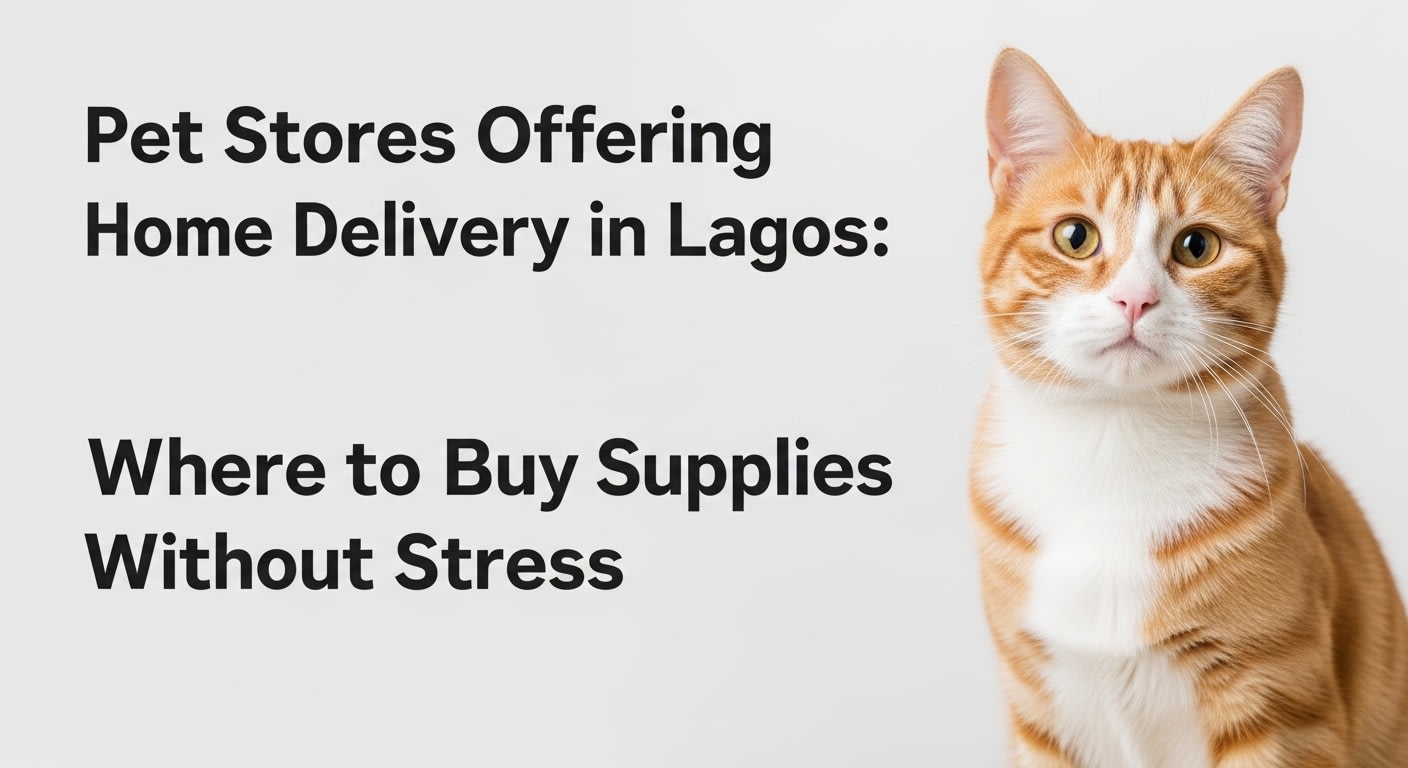Veterinarian
How To Become A Veterinarian In Nigeria | Schools & Career Opportunities
If you’ve ever dreamed of caring for animals and improving their wellbeing, then learning how to become a veterinarian in Nigeria might just be your first step toward a deeply fulfilling career. Mygotovet believes that every aspiring vet deserves a clear path to achieving their goals, from gaining admission into a top veterinary school to finding meaningful work after graduation. The veterinary profession is not only about treating animals; it also plays a vital role in public health, food security, and disease control across Nigeria.
Becoming a veterinarian in Nigeria requires dedication, strong scientific skills, and a compassionate heart. Fortunately, with the right guidance, anyone with genuine interest can navigate this journey successfully. Let’s explore the educational path, the best veterinary schools, and the many rewarding opportunities that come after earning your degree.
Educational Pathway to Becoming a Veterinarian in Nigeria
To practice as a licensed veterinarian, you must first obtain a Doctor of Veterinary Medicine (DVM) degree from an accredited institution. This journey generally takes six years if you gain admission through the Unified Tertiary Matriculation Examination (UTME) and five years if you apply via Direct Entry. After completing your degree, a mandatory one-year internship gives you practical experience in animal health, surgery, and clinical care.
Admission Requirements
Gaining admission into a veterinary medicine program in Nigeria is competitive. You must have five credit passes in core science subjects, English, Mathematics, Biology, Chemistry, and Physics, from WAEC or NECO, obtained in no more than two sittings.
For UTME, your subject combination must include English Language, Biology, Chemistry, and Physics. Although the general JAMB cut-off score is around 160, most veterinary programs require 180–220 or higher. To increase your chances, aim for a score of 250 and above, especially in highly ranked universities.
If you already hold an A’Level, ND, or HND in a relevant science field, you can apply for Direct Entry, which allows you to skip the first year and start from 200 or 300 level.
Tuition and Financial Aid
Tuition fees for veterinary schools in Nigeria vary significantly. Public universities are generally affordable, ranging from ₦150,000 to ₦250,000 per year, while private institutions charge more. When planning your education, don’t forget additional costs such as textbooks, laboratory fees, accommodation, and clinical materials. Fortunately, scholarships and bursaries are available for outstanding students who demonstrate both academic excellence and financial need.
RECOMMENDED:
Top 5 Online Veterinary Platforms in Nigeria [2025]
Global Veterinary Job Opportunities For Vets From Developing Countries [2025]
How Veterinarians In Africa Can Make Money Online
Top Veterinary Schools in Nigeria
Nigeria has several reputable universities offering accredited veterinary medicine programs under the regulation of the Veterinary Council of Nigeria (VCN). Choosing where to study is crucial since it affects your exposure, practical experience, and career opportunities.
Some of the top-rated schools include:
-
University of Ibadan (UI) – Nigeria’s oldest and most prestigious veterinary school, known for strong research and public health emphasis.
-
Ahmadu Bello University (ABU), Zaria – Offers extensive training in rural animal health and large-scale livestock management.
-
Federal University of Agriculture, Abeokuta (FUNAAB) – Recognized for modern facilities and strong agricultural integration.
-
University of Nigeria, Nsukka (UNN) – Ideal for those interested in veterinary research and clinical innovation.
-
Usmanu Danfodiyo University, Sokoto (UDUS) – Focused on practical learning and animal production management.
-
University of Jos (UNIJOS) – Specializes in zoonotic disease prevention and public health training.
-
Federal University of Agriculture, Makurdi (FUAM) – Known for its expertise in tropical animal health and disease control.
Michael Okpara Federal University of Agriculture Umudike(MOUAU)- offers a strong Veterinary Medicine program focused on animal production, preventive medicine, and public health.
Each of these universities has its unique strengths, so it’s essential to evaluate their curriculum, faculty, and clinical exposure before applying.
Inside the Veterinary Curriculum
The veterinary curriculum in Nigeria is designed to produce skilled, ethical, and competent animal health professionals. Students begin with basic sciences such as biology, chemistry, and physics, then progress into core veterinary courses like anatomy, physiology, pharmacology, pathology, and surgery.
Practical and clinical training make up a major portion of the program. During your fifth and sixth years, you’ll participate in clinical rotations, where you treat animals, perform diagnostic tests, and engage in surgical procedures under supervision.
Additionally, many universities now integrate entrepreneurship and veterinary economics, preparing graduates to start private clinics or animal health businesses. This well-rounded education ensures that you are not only a capable clinician but also a potential business leader.
Career Opportunities and Earning Potential
One of the most exciting parts of learning how to become a veterinarian in Nigeria is discovering the vast range of career paths available after graduation. With a DVM degree, you can work in numerous sectors:
-
Private Practice: Many vets run private clinics treating companion animals like dogs, cats, and birds. This is one of the most lucrative and flexible career paths.
-
Public Health and Government Service: Veterinarians play vital roles in disease surveillance, meat inspection, and public health agencies like NAFDAC.
-
Research and Academia: Some graduates choose to teach or conduct research in universities and veterinary institutes.
-
Agriculture and Industry: Opportunities exist in livestock management, feed production, pharmaceutical industries, and food processing.
-
Specialized Fields: Wildlife medicine, fish health, and zoo management are growing areas with increasing demand.
Salaries vary based on experience and location. Entry-level veterinarians earn around ₦250,000–₦200,000 per month, while mid-level professionals average about ₦550,000. With experience, veterinarians in senior roles can earn up to ₦1,000,000 or more monthly.
Moreover, as pet ownership continues to grow in urban areas, the demand for skilled veterinarians is rising steadily.
The Veterinary Council of Nigeria (VCN)
Every practicing veterinarian in Nigeria must register with the Veterinary Council of Nigeria (VCN). The council ensures professional standards, licenses practitioners, and enforces ethics. Without VCN registration, one cannot legally operate as a veterinarian.
The VCN also accredits veterinary schools, ensuring their programs meet national and international standards. Additionally, it supervises continuing professional development to help veterinarians stay updated with global best practices.
Your Journey Begins Now
Learning how to become a veterinarian in Nigeria is the start of a lifelong journey filled with purpose and opportunity. The profession allows you to care for animals, protect communities from zoonotic diseases, and contribute to national food safety. With the right training, passion, and support, you can make a significant impact in Nigeria’s growing animal health industry.
If you’re ready to start your veterinary journey, Mygotovet is here to help you take that first step. From career counseling to connecting you with top veterinary schools and internship opportunities, we’re committed to guiding your path every step of the way.
Begin your journey to becoming a licensed veterinarian in Nigeria today, contact Mygotovet and take your first confident step toward a rewarding career in animal health!
Frequently Asked Questions on How to become a Veterinarian in Nigeria
1. How many years does it take to become a veterinarian in Nigeria?
It typically takes six years to become a veterinarian in Nigeria through the UTME route, including classroom training, laboratory work, and clinical rotations. Students who enter via Direct Entry may complete their Doctor of Veterinary Medicine (DVM) degree in five years, followed by a one-year compulsory internship before full licensing.
2. What subjects are required to study Veterinary Medicine in Nigeria?
To study Veterinary Medicine in Nigeria, you must have five credit passes in English Language, Mathematics, Biology, Chemistry, and Physics from WAEC, NECO, or GCE. For JAMB UTME, you should register English Language, Biology, Chemistry, and Physics as your combination subjects. These subjects build the scientific foundation needed to succeed in veterinary studies.
3. What is the cut-off mark for Veterinary Medicine in Nigerian universities?
The general JAMB cut-off mark for most Nigerian universities is 160, but Veterinary Medicine programs are highly competitive. Therefore, candidates should aim for at least 200 to 250 in their UTME to stand a better chance of gaining admission into top universities such as the University of Ibadan (UI), Ahmadu Bello University (ABU), or FUNAAB.
4. Which university is best for Veterinary Medicine in Nigeria?
The University of Ibadan (UI) is widely regarded as the best university for Veterinary Medicine in Nigeria because of its long history, advanced facilities, and strong research foundation. However, other excellent universities include Ahmadu Bello University (ABU), University of Nigeria, Nsukka (UNN), Federal University of Agriculture, Abeokuta (FUNAAB), and Usmanu Danfodiyo University, Sokoto (UDUS).
5. What are the job opportunities for veterinarians in Nigeria?
Veterinarians in Nigeria can work in private practice, public health, government agencies, academia, or animal-related industries. Some also specialize in wildlife medicine, fish health, and research. With rising pet ownership and livestock expansion, the demand for qualified veterinarians continues to grow.
6. How much does a veterinary doctor earn in Nigeria?
A veterinary doctor’s salary in Nigeria varies depending on experience and location. Entry-level veterinarians earn between ₦250,000 and ₦400,000 per month, while mid-level professionals earn around ₦550,000 monthly. Senior veterinarians with 10+ years of experience can earn ₦1,000,000 or more per month, especially in private practice or specialized fields.
7. Is Veterinary Medicine a good career in Nigeria?
Yes, Veterinary Medicine is a rewarding and respected career in Nigeria. It offers diverse job opportunities, good earning potential, and the chance to make a meaningful difference in both animal and human health. The profession also contributes to food safety, public health, and disease prevention, making it essential to national development.
8. What body regulates veterinarians in Nigeria?
The Veterinary Council of Nigeria (VCN) is the official body that regulates the veterinary profession. It ensures that veterinary schools maintain high educational standards, registers qualified veterinarians, and enforces ethical conduct. Practicing without VCN registration is illegal.
9. Can I work abroad with a Nigerian veterinary degree?
Yes, graduates with a Nigerian Doctor of Veterinary Medicine (DVM) degree can work abroad, but they must fulfill additional requirements such as licensing exams or credential evaluations depending on the country. For instance, the UK, USA, and Canada often require professional equivalency exams before granting full practice rights.
10. How can Mygotovet help me become a veterinarian in Nigeria?
Mygotovet supports aspiring veterinarians by providing guidance, mentorship, and access to top veterinary schools in Nigeria. The platform also helps students prepare for admission exams, find internships, and connect with reputable animal health employers. Through continuous learning resources and professional networks, Mygotovet empowers young vets to build successful, impactful careers.
11. Do veterinarians only treat pets?
No, veterinarians do much more than treat pets. They care for livestock, poultry, wildlife, and aquatic species, ensuring animal welfare and food safety. Many also work in public health, disease surveillance, and veterinary research, contributing to the control of zoonotic diseases that can affect humans.
12. What is the difference between animal science and veterinary medicine?
Animal Science focuses on the production, nutrition, and management of farm animals, while Veterinary Medicine deals with disease diagnosis, treatment, and prevention in animals. In short, animal scientists ensure animals grow and reproduce efficiently, while veterinarians ensure they stay healthy and disease-free.
13. What skills are important for a successful veterinary career?
A good veterinarian must possess scientific knowledge, problem-solving ability, compassion, communication skills, and manual dexterity. Additionally, time management, teamwork, and business acumen are crucial for those planning to run private clinics or manage farms.
14. How can I prepare for veterinary school in Nigeria?
To prepare effectively, focus on your science subjects in secondary school, gain exposure to animals through volunteering, and research the best universities for veterinary medicine. Staying informed through platforms like Mygotovet can also help you understand career paths, entry requirements, and internship opportunities.
15. Can veterinarians open their own clinics in Nigeria?
Yes, licensed veterinarians in Nigeria can own and operate private clinics after registering their premises with the Veterinary Council of Nigeria (VCN). This path allows for greater independence, higher earning potential, and opportunities to specialize in pet care, surgery, or diagnostics.
Animal Health & Blogs

11 February 2026
0 likesValentine’s Day gifts for pet lovers in Nigeria aren’t just cute, they’re thoughtful, useful, and often necessary for vibrant pet health. Whether y ...
Read More
09 February 2026
0 likesAcross Nigeria, more pet owners are ditching stressful market runs and overpriced shops. Instead, they now rely on trusted online pet stores to buy ...
Read More
09 February 2026
0 likesIf you are looking for pet stores offering home delivery in Lagos, the simple answer is yes, you can now get trusted pet supplies delivered straigh ...
Read More